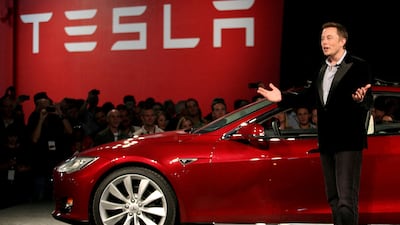Panasonic is moving closer to bringing next generation lithium-ion batteries to the market, which is expected to substantially cut the cost of electric vehicles such as Tesla.
The Japanese electronics maker has been developing a bigger “4680” battery that Tesla chief executive Elon Musk believes is key to placing EVs in the $25,000 price bracket.
Tesla's Model 3 starts at about $41,000 with tax incentives.
The battery, about five times bigger than those currently supplied to Tesla, would allow the US car maker to lower production costs and improve vehicle range.
The 4680 battery will have a “considerable impact” in lowering the cost of EVs, enabling them to spread more widely and, in turn, lower carbon emissions, said Kazuo Tadanobu, chief executive of Panasonic's energy business.
However, surging costs of raw materials, made worse by Russia's military offensive in Ukraine, are expected to slow and even temporarily reverse the long-term trend of falling costs of batteries, according to Gregory Miller, an analyst at industry forecaster Benchmark Mineral Intelligence.
This year could mark the first yearly increase in the average price of lithium-ion battery cells, Mr Miller said.
High EV prices matter because mainstream consumers are not going to pay a large premium for technology that many do not yet fully embrace, research company Cox Automotive told Reuters on Tuesday.
Panasonic is reportedly looking to purchase land in the US for a mega-factory to manufacture the new battery, according to Japanese public broadcaster NHK.
However, the company has not made a final decision on a US production plant, Mr Tadanobu told Bloomberg during an interview.
Last month, Panasonic announced that it would open a production line at its Wakayama Factory in western Japan to manufacture 4680 lithium-ion batteries as part of its plans to expand its business globally.
Global sales of EVs more than doubled to 6.6 million in 2021 as people opted for eco-friendly alternatives to traditional fuel guzzlers, according to an International Energy Agency report.
Worldwide EV sales currently enjoy a market share of 9 per cent in the overall car industry, more than double the 4.1 per cent share in 2020, when three million units were sold, and more than triple 2019's 2.5 per cent share, when 2.2 million cars were sold, the agency said.
“Currently, Panasonic is developing a new high-capacity lithium-ion battery, the 4680, in multiple locations within Japan,” the company said.
“The company will progressively develop production capabilities in preparation for the full roll out. Along with structural improvements, two additional production lines, as well as utility facilities, will be established at the Wakayama Factory, and productivity verification and mass production are set to begin in the fiscal year ending in March 2024.”
Developing the new batteries has “taken an immense amount of stamina” over the past months, Mr Tadanobu told Bloomberg.
Panasonic’s attention to safety will help it maintain an edge going forward, even as Tesla moves to produce its own 4680 cells and other rivals are also rumoured to be considering production, Mr Tadanobu said.
The company’s advantage lies in its ability to “use craftsmanship to maintain safety even while raising the performance of a battery”, he said.
After leading development of the cells, Panasonic will work to retain its top spot, Mr Tadanobu said.
“We don’t want to lose.”








